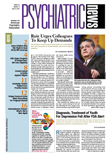Almost two years after Hurricane Katrina tore New Orleans apart, the region's devastated mental health system faces a serious shortage of the personnel needed to rebuild it.
General health and mental health leaders assessed the city's and state's mental health needs during a May congressional forum attended by staff from offices throughout Capitol Hill. They described a city overwhelmed by the immediate mental health care needs of many residents.
“In the short term the biggest challenge continues to be the [lack of a health care] workforce,” said Frederick Cerise, secretary of the Louisiana Department of Health and Hospitals. “Hospitals say that if they had more people they could provide more beds.”
The state launched a workforce initiative to recruit medical professionals nationwide to the area for a minimum of three years, but many professionals who are coming to the area are filling lucrative positions with private contractors, Cerise said. Further complicating the recruitment effort is the“ piecemeal” rebuilding in the city, which has insufficient housing for even its smaller post-Katrina population.
“We've got a lot to do in terms of recruiting people back to the area,” Cerise said.
That dearth of personnel has made it very difficult for the city and state to offer inpatient psychiatric care. New Orleans has only 20 adult public psychiatric beds, significantly fewer than the 99 such beds and 40 crisis unit beds available before the hurricane, according to Howard Osofsky, M.D., Ph.D., chair of psychiatry at Louisiana State University Health Sciences Center.
Cerise described an effort by state health officials to get private hospitals and clinics in the city to accept state funding for inpatient psychiatric beds, but only one accepted the offer. It will provide 12 new beds.
The limited public mental health services for children also have shrunk since the storm. New Orleans has only 15 child and adolescent public psychiatry beds—half of the number available before Katrina.
The 12,000 evidence-based mental health evaluations conducted by state mental health workers and the services they provided for displaced youngsters returning to the city after Katrina have shown that there is an enormous need for such care.
Data collected by the New Orleans school system indicate, for example, that 45 percent of students screened on their return to school this year displayed symptoms that qualify them for mental health care, 12 percent of fourth-grade students asked for counseling, and 25 percent of the students who asked for counseling showed “significant symptoms of depression,” he said.
“There certainly is an increase in mental illness, some pre-existing and some new,” Osofsky noted. He urged Congress to provide funding to restore school-based clinics for the city's youth, a population that usually responds best to preventive care and early interventions. Mental health care leaders have introduced more group treatment models for children and adolescents to address the trauma they have experienced and conditions that may arise from ongoing dislocations.
Extent of Need Documented
The anecdotal evidence presented to congressional staff of the increased mental health needs was reinforced by a survey of New Orleans area residents released in May by the Kaiser Family Foundation. The in-person survey of 1,500 randomly selected adults in the greater New Orleans area found that 15 percent rated their mental health as being worse than before the storm. Four percent also said they had begun taking psychiatric medication since Katrina.
The storm's impact on children was seen in the response of 4 percent of parents who said that their child shows signs of behavioral problems. Nine percent said their children didn't get needed general health care in the previous six months.
The hurricane's impact also took a toll on physical health. Twelve percent of those surveyed rated their physical health as worse after the storm, and 11 percent said a chronic condition had worsened since that disaster. Respondents further reported increased alcohol use, increased verbal or physical conflict in their relationships, and storm-related stress ending marriages or other personal relationships.
Residents sent a strong message about the need for additional health care services in New Orleans. Eighty-eight percent of respondents said there were insufficient hospitals, clinics, and other health facilities operating, while 89 percent said there were insufficient health care services for uninsured and low-income residents.
“It's a system in need of immediate help, not just long-term planning,” said Diane Rowland, one of the survey's authors.
Future Plans Described
Cerise said the state's goals include establishing crisis-response services, adding psychiatric beds, jail-diversion programs, and supported-living programs. The state, he said, is committed to continuing the mental health programs started under the $80 billion in federal block grants provided for Louisiana after the storm.
Disagreements among health care leaders continue over what new form Charity Hospital should take, Officials are planning to replace the former facility for the city's poor—and a major teaching hospital—with a decentralized system of smaller facilities spread throughout the city.
Health officials also are designing a long-term mental health system that will replace the office-visit-based model of care with the “medical home model,” in which a physician coordinates the overall care of each patient, Cerise said. The approach should increase the availability of physician contact through increased use of e-mail consultations and telemedicine—already in use in a neighboring county of New Orleans.
Osofsky urged funding for counselors and psychiatric nurses who would be available 24 hours a day and seven days a week. The city also needs to re-establish a crisis inpatient unit in a New Orleans hospital. The lack of such services in the city has resulted in increased incarceration of people with mental illness and mental health providers sending people to other parts of the state for care, he said.
“This means that children are separated from parents,” Osofsky said.
More information on the Kaiser survey is posted at<www.kff.org>.▪
